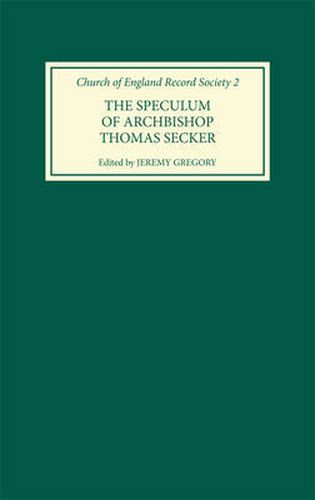Readings Newsletter
Become a Readings Member to make your shopping experience even easier.
Sign in or sign up for free!
You’re not far away from qualifying for FREE standard shipping within Australia
You’ve qualified for FREE standard shipping within Australia
The cart is loading…






The Speculumcompiled by Archbishop Thomas Secker (1758-68) is a major source for our understanding of the position of the Church of England in the mid-eighteenth century. A parish by parish digest of the returns submitted to the archbishop between 1758 and 1761, in the main for the diocese of Canterbury but including several others. It contains very full information on such matters as the size and social structure of the parishes; the names and qualifications of the clergy; their wealth; and their relations with Roman Catholics and protestant dissenters. Part of the significance of the Speculumis its witness of the pastoral pressure applied by Secker, allowing the historian to assess how far an energetic archbishop was ableto improve the standards of pastoral provision in the parishes under his care. This edition has attempted to preserve the spelling and capitalisation of the original, and editorial notes give biographical information on the large number of persons mentioned in the text, as well as identifying other textual allusions. JEREMY GREGORYis Lecturer in History at the University of Northumbria.
$9.00 standard shipping within Australia
FREE standard shipping within Australia for orders over $100.00
Express & International shipping calculated at checkout
Stock availability can be subject to change without notice. We recommend calling the shop or contacting our online team to check availability of low stock items. Please see our Shopping Online page for more details.
The Speculumcompiled by Archbishop Thomas Secker (1758-68) is a major source for our understanding of the position of the Church of England in the mid-eighteenth century. A parish by parish digest of the returns submitted to the archbishop between 1758 and 1761, in the main for the diocese of Canterbury but including several others. It contains very full information on such matters as the size and social structure of the parishes; the names and qualifications of the clergy; their wealth; and their relations with Roman Catholics and protestant dissenters. Part of the significance of the Speculumis its witness of the pastoral pressure applied by Secker, allowing the historian to assess how far an energetic archbishop was ableto improve the standards of pastoral provision in the parishes under his care. This edition has attempted to preserve the spelling and capitalisation of the original, and editorial notes give biographical information on the large number of persons mentioned in the text, as well as identifying other textual allusions. JEREMY GREGORYis Lecturer in History at the University of Northumbria.